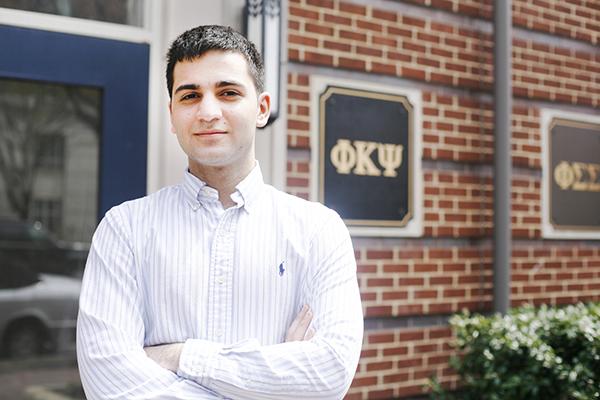When militants began targeting Marwan Sulaiman’s family in 2007, it became unsafe for the Baghdad-native to go to school.
Then a family in New Canaan, Conn. read about his family’s situation in a New York Times story and offered him the chance to move thousands of miles away form his war-torn country and receive a top-quality education.
He moved in with the family and attended private school in U.S. Three years later he was accepted to GW in its early decision round, setting off a weeks-long wait to see if he would win financial aid.
With no word from GW, Sulaiman thought he would have to put college on hold until he found out that he had been given a full-ride scholarship created to support political refugees pursuing higher education.
“It was everything I dreamt of because it allowed me to be just another student,” Sulaiman said. “I didn’t want to struggle. I just wanted to focus on classes and social life and the GW experience.”
That scholarship was donated in honor of Dirk Brady, who went to GW after escaping Nazi Germany in 1936. Working his way through school, it took him seven years to earn a degree. Years later, his nephew donated funds to help other students who are facing adverse circumstances.
The scholarship is one of many funds supported by GW donors as part of the University’s Power and Promise scholarship fund.
GW added 14 endowed scholarships and fellowships this year, including gifts to the GW Law School and the Milken Institute School of Public Health.
“I didn’t want to struggle. I just wanted to focus on classes and social life and the GW experience.”
The Power and Promise scholarships fund, which has raised $100 million over the last five years, grew about 13 percent last year.
The University raised $15.6 million for the fund this past fiscal year, which was about 15 percent of its total fundraising haul.
Now, Sulaiman, an international affairs major, said he sometimes feels more American than Iraqi. Since he moved to the U.S. seven years ago, he has only returned home once to visit his family, who still live in constant fear.

His mother commutes to work at the World Bank office in Baghdad, located in one of the most dangerous areas of the city. His father, an engineer, was once nearly hit by bullets from a militant who opened fire on a crowd with a machine gun. His father narrowly escaped, jumping into a construction hole while dozens of people around him died.
“That’s how we live. It’s just basic everyday things. When I talk about it, people get uncomfortable but then I realize it’s not normal,” Sulaiman said.
When he graduates in May, Sulaiman will continue working at a nonprofit news station called Middle East Broadcasting Networks, where he has worked full-time as a production assistant since his sophomore year.
Sulaiman, a member of the Phi Kappa Psi fraternity, said his friends from Iraq would probably be shocked by his transformation in the U.S., including his openness to discussing political topics like gay marriage.
“It’s not even a subject. They’re not even there yet. They can’t even discuss it,” he said.







